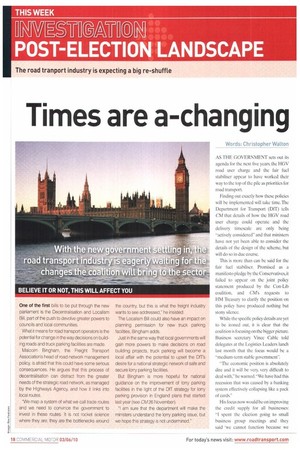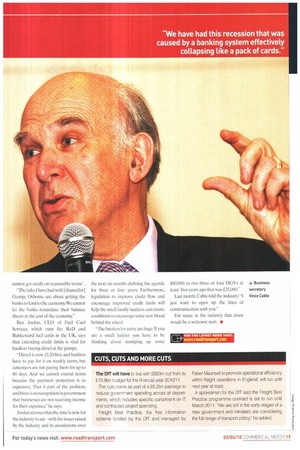Times are a-changing
Page 18

Page 19

If you've noticed an error in this article please click here to report it so we can fix it.
AS THE GOVERNMENT sets out its agenda for the next five years, the HGV road user charge and the fair fuel stabiliser appear to have worked their way to the top of the pile as priorities for road transport.
Finding out exactly how these policies will be implemented will take time. The Department for Transport (DfT) tells CM that details of how the HGV road user charge could operate and the delivery timescale are only being "actively considered" and that ministers have not yet been able to consider the details of the design of the scheme, but will do so in due course.
This is more than can be said for the fair fuel stabiliser. Promised as a manifesto pledge by the Conservatives, it failed to appear on the joint policy statement produced by the Con-Lib coalition, and (Ms requests to HM Treasury to clarify the position on this policy have produced nothing but stony silence.
While the specific policy details are yet to be ironed out, it is clear that the coalition is focusing on the bigger picture. Business secretary Vince Cable told delegates at the Logistics Leaders lunch last month that the focus would be a "medium-term stable government".
"The economic position is absolutely dire and it will be very, very difficult to deal with," he warned. "We have had this recession that was caused by a banking system effectively collapsing like a pack of cards."
His focus now would be on improving the credit supply for all businesses: "I spent the election going to small business group meetings and they said 'we cannot function because we cannot get credit on reasonable terms'.
The talks I have had with [chancellor] George Osborne are about getting the banks to lend to the economy. We cannot let the banks resuscitate their balance sheets at the cost of the economy."
Ben Jordan, CEO of Fuel Card Services, which runs the ReD and Bunkereard fuel cards in the UK, says that extending credit limits is vital for hauliers buying diesel at the pumps.
"Diesel is now £1.20/litre and hauliers have to pay for it on weekly terms, but customers are not paying them for up to 60 days. And we cannot extend terms because the payment protection is so expensive. That is part of the problem, and there is no recognition in government that businesses are not receiving income for their expenses," he says.
Jordan stresses that the time is now for the industry to act with the issues raised by the industry and its associations over the next six months defining the agenda for three or four years. Furthermore, legislation to improve credit flow and encourage improved credit limits will help the small family hauliers, and create conditions to encourage some new blood behind the wheel.
The barriers for entry are huge. If you are a small haulier you have to be thinking about stumping up some £60,000 to run three or four HGVs at least."IWo years ago that was £25,000."
Last month, Cable told the industry: "I just want to open up the lines of communication with you."
For many in the industry that alone would be a welcome start. •
































































































































